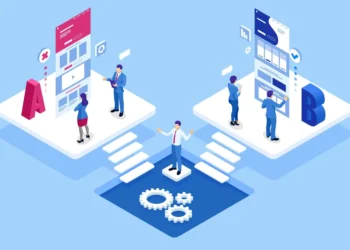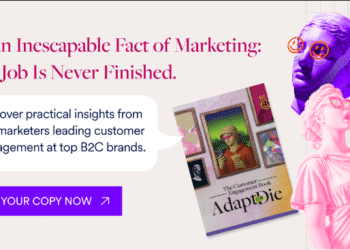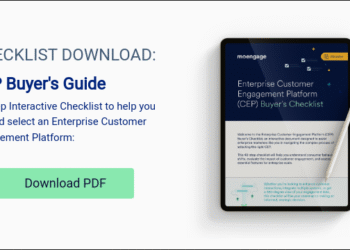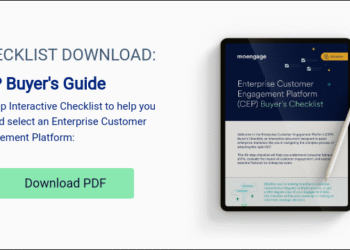Reading Time: 4 minutes
Lifecycle marketers are facing a profound shift in how they engage customers.
Artificial intelligence (AI) has emerged as both a promise and a pressure point, positioned as the key to delivering hyper-personalized, timely, and impactful experiences.
Yet behind the AI hype lies a more nuanced reality: executing AI-driven lifecycle marketing at scale is often messier than advertised. Marketers are caught between high expectations and systemic challenges, from fragmented data to stalled adoption and internal roadblocks.
Understanding what’s holding AI back (and how to move forward with confidence) is essential for modern lifecycle teams.
The Great Data Disconnect
One of the most persistent obstacles to realizing AI’s potential in customer engagement and lifecycle marketing is the inability to access and seamlessly activate customer data. Many marketers report being bottlenecked by their reliance on centralized data teams, which slows down the ability to test, iterate, and personalize campaigns at scale.
While platforms frequently advertise integrations with major data warehouses such as Snowflake, Databricks, and Amazon Redshift, the reality often falls short.
These connections may exist in name but not in function.
Instead of enabling real-time audience segmentation or event-triggered personalization, many marketers are forced to rely on manual data exports, SQL queries, or engineering support just to get campaigns off the ground. This idea reinforces what many already know from experience: a tech stack is only as powerful as its weakest connection.
The end goal isn’t just connection, but cohesion.
You need platforms that support bi-directional data sync, real-time event streaming, and transparent visibility across the customer journey without additional tools or workarounds.
Until these capabilities are widespread, you’ll continue to feel like your AI ambitions are constrained by outdated infrastructure.
When AI Falls Short: Fatigue, Friction, and Fading ROI
Even with the right data, many marketers are growing skeptical of AI’s ability to deliver tangible results.
AI fatigue is real.
Teams have poured time and resources into personalization engines, predictive analytics models, and generative content tools…only to find underwhelming returns.
This disconnect isn’t imagined. Many AI projects ultimately fail to deliver on their promised ROI, often due to unclear use cases, lack of stakeholder alignment, or insufficient change management.
For lifecycle marketers, this often plays out as prolonged proof-of-concept cycles (hello, year-long POC that never seems to end…) that absorb months of energy with little to show. It’s not uncommon for teams to invest in tools that generate predictive churn scores or optimal send times, only to realize those insights aren’t actionable within their rigid engagement platforms.
The issue is compounded by the flood of marketing tools claiming AI capabilities. In many cases, the “AI” is little more than rule-based automation in disguise, creating confusion around what real AI looks like and how it should be evaluated.
The Hidden Cost of Vendor Lock-In
Another growing concern is vendor lock-in. As marketing tech stacks expand, so does the risk of becoming overly dependent on a single vendor’s ecosystem. This can be especially problematic when marketers outgrow their existing platforms but fear the complexity and disruption of switching.
Model Context Protocols (MCPs) offer a path forward. These emerging frameworks are designed to create portable, standardized models for audience segmentation and campaign orchestration.
With MCPs, marketers can define core elements—like audiences, campaign flows, and experimentation strategies—in a vendor-agnostic way. This means if they switch platforms, they don’t have to rebuild everything from scratch.
The appeal is clear: reduced rework, faster time to value, and more flexibility in choosing best-of-breed tools. MCPs are still gaining traction, but their potential to reduce friction and future-proof marketing strategies is significant.
Meanwhile, marketers continue to seek out credible migration stories that show what platform transitions look like in practice. Clear documentation, proven onboarding frameworks, and peer testimonials are increasingly essential for vendors looking to attract modern, data-savvy teams.
Practical Tips for Testing and Evaluating AI Tools
Despite the challenges, marketers can adopt a more strategic approach to AI: one that reduces risk and increases clarity. Instead of jumping into full-scale deployments, teams can take smaller, more deliberate steps.
Using the following tactics, you can better differentiate between hype and real capability, allowing you to adopt AI tools that align with your goals and constraints.
1. Use sandbox environments
Ask for a sandbox to simulate real use cases without impacting production data. This allows teams to pressure-test capabilities before committing.
2. Prioritize transparent case studies
Look for success stories that offer a behind-the-scenes look at implementation, challenges, and actual results, not just polished outcomes.
3. Test integration depth, not just compatibility
Don’t stop at “Yes, we integrate.” Ask: Can you trigger journeys based on real-time data? Can attributes update dynamically? Does data flow both ways?
4. Evaluate vendor support and education
The best tools come with great training, responsive support, and documentation that accelerates onboarding and learning.
5. Learn from your peers
Communities like the Lifecycle Luminaries Slack channel offer real, unfiltered feedback from practitioners. These sources are often the most trustworthy and valuable for unbiased opinions.
Embracing AI Realistically and Strategically
AI has the power to transform lifecycle marketing, but only when it’s applied with clarity, intention, and the right foundation. Success doesn’t come from chasing the flashiest tools. It comes from solving real problems: fragmented data, limited visibility, and disconnected systems that prevent marketers from executing the strategies they already know will work.
That’s why the most effective marketers right now aren’t asking, “How do I use more AI?” They’re asking, “Where can AI remove friction and help me act faster, smarter, and with more confidence?”
At MoEngage, we’ve seen meaningful results when AI is embedded directly into the marketing workflow, not layered on top as an afterthought.
Our AI engine, Sherpa, supports use cases like predictive segmentation, intelligent send-time optimization, and creative performance insights. These features are designed to help marketers spend less time reacting and more time proactively engaging their customers.
This isn’t about replacing human decision-making. It’s about making smarter decisions, faster, with AI as the assistant, not the driver.
As lifecycle marketing continues to evolve, the marketers who succeed won’t be the ones with the most tools.
They’ll be the ones who combine strategic thinking, team alignment, and well-integrated AI to deliver personalized, timely, and scalable customer experiences.
Marketers must remain curious but skeptical, innovative but grounded. Those who strike the right balance will be best positioned to harness AI’s full potential (not just as a trend), but as a lasting engine of engagement and growth.
The post Navigating the AI Revolution in Lifecycle Marketing: Challenges & Opportunities appeared first on MoEngage.
















